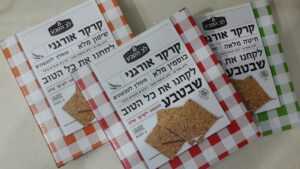Many thanks to all who responded, supported and smiled through email, text messages and conversations regarding the Chubeza price rise. In conclusion, these are the projected prices beginning February:
Small vegetable box – 90 NIS Large vegetable box – 115 NIS Small fruit box – 60 NIS Large fruit box – 90 NIS Family Fruit box remains 140 NIS Delivery fees remain unchanged.
___________________________________________
In honor of the great winter approaching us, we have new products and new sales for old products that will make you happy and warm you up over the freezing days ahead:
 Eliezer of Sihorshei Tzion has informed us of a new, delectable product: Raw Sprouted Nuts, Almonds, Pecans, Walnuts, Cashew in packages of 100/350 gram.
Eliezer of Sihorshei Tzion has informed us of a new, delectable product: Raw Sprouted Nuts, Almonds, Pecans, Walnuts, Cashew in packages of 100/350 gram.
This healthy snack can be eaten raw as a healthy delicious snack, to garnish vegetable or fruit salads, add to granola, desserts, or as a raw ingredient in any recipe!
The Process
We begin soaking the nuts in filtered water for 12-24 hours. This awakens the nut and begins the sprouting process. The nuts are then rinsed and dried at a low temperature (below 46c) for 24 – 36 hours giving them a delicious crisp and crunchy flavor and enhancing their nutritional value
Why Sprouted?
The sprouting process activates enzymes and neutralizes harsh acids found in all nuts, seeds, and grains. This process aids digestion and absorption of essential nutrients. Sprouting can also reduce up to 50% fat and 25% calories and increase protein up to 30% in food.
Why Raw Food?
Food heated over 115 F is diminished of its enzymes and nutrients. Eating raw food allows for easy digestion and absorption of nutrients, and contributes strength & energy to the entire body.
Raw Sprouted Nuts and all other unique products of Shorshei Tzion can be ordered via our order system.
_____________________________
We have been working with Assaf and Zohar from Lev Ha’aretz for some time now. Their story is very appropriate for wintery weather… When the small food company where they were both employed was suddenly sold to one of the bigger companies in Israel, they decided that in order to fulfill a dream, one must proceed down even the foggy roads.
They made the decision to create high-quality, tasty and healthy products, as well as providing work for residents of the north, and then set out to raise funds. With great efforts, assisted by family and friends, they finally established a small cracker factory, which began as a fulfillment of a dream and is marching on, an accomplishment not to be taken for granted these days, all due to the great dedication and responsibility of Assaf, Zohar and their crew. Today, the factory produces a variety of excellent crackers for the local market, and recently they have begun exporting as well. All the while, they keep getting better and more creative, all because of their persistence (and the fact that they are good people).
Zohar and Assaf’s crackers are made out of simple, healthy and basic components: flour, grains and seeds, with no sugar or other preservatives. Lev Hateva offers crackers in three different flavors: wheat, rye and spelt. Besides their great health value and excellent flavor, I believe that the fact they are made in a northern factory is of great significance. The factory employs local residents, including youth and challenged individuals, helping them make a step towards integrating into the employment market.
Over the coming month Lev Hateva is offering a special price for their excellent crackers: one package for 17 NIS, two for 22 NIS.
If you haven’t experienced them yet, I encourage you to sample the crackers and fall in love. Those of you who already are hooked – here is your chance to spoil yourselves with the greatest crackers for an excellent price.
Orders via our order system.
_______________________________________
<iframe src=”https://www.youtube.com/embed/eCDNkAgvp_k” width=”854″ height=”480″ frameborder=”0″ allowfullscreen=”allowfullscreen”></iframe>
Believing I am an oak in a rock, Even if a storm hits me, I will overcome it. When I shed tears, I sow. Sorrow is the soul, I am nature. Believing in mankind the heavens, And the tree and sea, I will be. As long as I am, I will remember the thought That happiness is mankind, And touch it I ought. (An Oak in the Rock, Avishai Cohen)
This beautiful poem came to my mind at this time of year, Tu B’Shvat, at the peak of the storm and cold weather. We, too, hope and wish to overcome the upcoming storm. We’ve covered our more sensitive vegetables with cloth sheets, and some of them are planted in the net house or hiding under the plastic tunnels protecting them from hail, but we’re definitely fearful of the upcoming frost. Keep your fingers crossed for us! And stay tuned for our report next week!
Tu B’Shvat, celebrating the birthday of the trees, began as a bureaucratic appointed time, the beginning of taxation (Terumah) for the fruits of the tree. Since every year a tithe is given from the yield, it was necessary to decide from when the year is counted, and the 15th of Shvat was given the honor of being the definitive date. But this explanation is rather impersonal and totally misses out on the connection, reliance and reflection between man and nature, specifically the trees.
The month of Shvat was chosen as it is the season in which the trees renew their fertility cycle. The name Shvat derives from the word “shevet”, meaning a branch. During this time of the year, the branches dance and beat at the great winds, bend under the raindrops or snow, break or flex, sometimes even stunned by lighting. Yet amidst this chaos, they begin lengthening, adding young green and delicate branches, the buds swell and new leaves and flowers grow and bloom, in preparation for fruit.
And how is fruit born? Just like a baby.
Every fruit develops from a flower (usually following pollination). After pollination, the flower changes: its petals, stamen and calyx wilt, and the fertilized cells divide and grow into the embryo – the seed. The embryo cells divide into tissue and organs of the seed (the radicle and plumule surrounding the endosperm – a food-hoarding tissue). In Hebrew, the first stage in the ripening of the fruit has a specific name: חנטה. When it begins, water and nutrients start arriving to the cells, and they rapidly divide and grow. The ovary grows, its walls thicken and the stem surrounding it becomes juicy and grows as the seeds develop within it. Usually you can see the remains of the sepals of the dried-up flower at the top of the fruit. This stage is extremely sensitive to weather change, strong winds and rain, as many tiny fruits can fall off the plant as a result.
When this stage ends, the fruit begins to ripen, and changes appear in its size, shape, scent, color, flavor, texture and softness. The fruit is the organ which contains the seeds, wrapping them in a juicy layer and peel. The fruit has a huge significance to the continuation of the plant, as here is where the plant’s “embryo” lies, protecting it and assisting it to spread the seed and become absorbed in the earth.

The sages of the Mishna declared the middle of the Shvat to mark the initiation of the tithe-giving year. Observing Nature closely, they came to realize that by Shvat, a large quantity of rain has fallen and as the days grow longer and spring approaches, the trees begin to mature חנטה and the fertilized flowers start turning into fruits. This awakening in Nature and the sweet promise it holds, coupled with fear and anxiety as to the fulfillment of this promise, turned Tu B’Shvat into a day of liturgy, special prayers and the celebration of the Lord’s abundance through nature, in a festive meal of local fruit, its juices and natural delicacies.
I love that poem by Avishai Cohen because it so beautifully expresses the tree’s utter existence, the security and the calm of its stability, rooted (but not stuck…), accepting, embodying contradiction, existing. This Tu B’Shvat, may we be blessed to enjoy renewal, change and the movement of this season: to open our eyes, take in the scents, listen to the rustling, and at the same time know how to simply extend our roots and branches and live.
Wishing us all a happy Tu B’Shvat, and the ability to weather any storm, any time!
Sending you much warmth,
Alon, Bat Ami, Dror, Yochai and the entire Chubeza team
________________________________
WHAT’S IN THIS WEEK’S RAINY TU B’SHVAT BOXES?
Monday: Broccoli, coriander/parsley/mint, tomatoes, lettuce, kale/spinach/Swiss chard, cucumbers, beets/cabbage, leeks/onions, potatoes/ sweet red peppers, celery/celeriac. Small boxes only: radishes/ baby radishes/turnips.
Large box, in addition: Fennel, baby greens (mesclun mix)/mustard greens, cauliflower, snow peas/carrots.
Wednesday: onions/leek, cucumbers, cilantro/parsley/mint, Swiss chard/kale/Chinese cabbage, tomatoes, carrots, lettuce, broccoli/cabbage/cauliflower, potatoes, celery/celeriac, small boxes: beets/fennel/radish/turnip.
Large box, in addition: baby greens (mesclun mix), spinach/New Zealand spinach, fava beans/snow peas/peppers, beets.
And there’s more! You can add to your basket a wide, delectable range of additional products from fine small producers: flour, fruits, honey, dates, almonds, garbanzo beans, crackers, probiotic foods, dried fruits and leathers, olive oil, bakery products and goat dairy too! You can learn more about each producer on the Chubeza website. On our order system there’s a detailed listing of the products and their cost, you can make an order online now!

